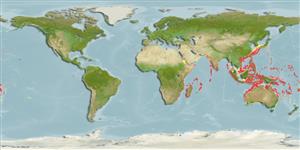Common names from other countries
Klassifizierung / Names
Namen | Synonyme | Catalog of Fishes(Gattung, Arten) | ITIS | CoL | WoRMS | Cloffa
>
Kurtiformes (Nurseryfishes, cardinalfishes.) >
Apogonidae (Cardinalfishes) > Amioidinae
Etymology: Amioides: Gender of genus not indicated by Smith and Radcliffe; a combination of Greek Amia, a feminine noun, for a kind of fish, with the suffix '-oides' meaning like or resembling; thus governed by the gender of the noun, in this case the compound word is feminine.; polyacanthus: Vaillant suggested the name polyacanthus based on the canine teeth and spines in the first
dorsal fin that differed from Cheilodipterus species (however, no name derivation was given by him). Fraser (2013) assumed that the masculine Greek noun 'akanthos' meaning prickly plant, as acanthus and the prefix 'poly-' meaning many or very; treated as a noun in apposition..
More on author: Vaillant.
Environment: milieu / climate zone / depth range / distribution range
Ökologie
seewasser benthopelagisch; tiefenbereich 70 - 276 m (Ref. 94268). Temperate
Indo-Pacific.
Size / Gewicht / Alter
Maturity: Lm ? range ? - ? cm
Max length : 22.0 cm TL Männchen/unbestimmt; (Ref. 9137)
Rückenflossenstacheln (insgesamt): 8; Rückenflossenweichstrahlen (insgesamt): 10; Afterflossenstacheln 2; Afterflossenweichstrahlen: 8. Body shape similar to chielodipterid fishes, but differs in having 7 spines in the 1st dorsal fin (versus 6 in chielodipterids). Sharp canine teeth present on both jaws. A dark-brown longitudinal stripe runs under the lateral line of midbody but is indistinct at the caudal base.
Inhabits reef slopes in 70-150 m (Ref. 90102).
Life cycle and mating behavior
Geschlechtsreife | Fortpflanzung | Ablaichen | Eier | Fecundity | Larven
Distinct pairing during courtship and spawning (Ref. 205).
Fraser, T.H., 2013. Family status of Amioides and the senior synonym of Coranthus (Percomorpha: Apogonidae). Copeia 2013(1):23-30. (Ref. 94268)
IUCN Rote Liste Status (Ref. 130435)
CITES (Ref. 128078)
Not Evaluated
Bedrohung für Menschen
Harmless
Nutzung durch Menschen
Fischereien: kommerziell
Mehr Information
ReferenzenAquakulturAquakultur ProfilZuchtlinienGenetikElectrophoresesVererbbarkeitKrankheitenVerarbeitungMass conversion
Tools
Zusatzinformationen
Download XML
Internet Quellen
Estimates based on models
Preferred temperature (Ref.
115969): 16.9 - 25.9, mean 20.5 (based on 203 cells).
Phylogenetic diversity index (Ref.
82804): PD
50 = 1.0000 [Uniqueness, from 0.5 = low to 2.0 = high].
Bayesian length-weight: a=0.00389 (0.00180 - 0.00842), b=3.12 (2.94 - 3.30), in cm Total Length, based on all LWR estimates for this body shape (Ref.
93245).
Trophic level (Ref.
69278): 3.5 ±0.50 se; based on food items.
Widerstandsfähigkeit (Ref.
120179): hoch, Verdopplung der Population dauert weniger als 15 Monate. (Preliminary K or Fecundity.).
Fishing Vulnerability (Ref.
59153): Low vulnerability (12 of 100).
